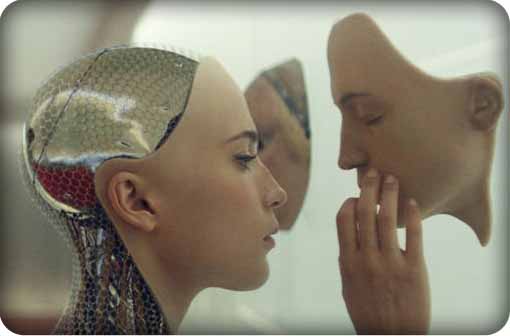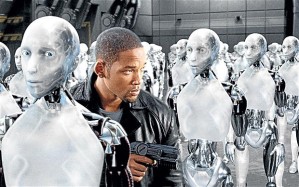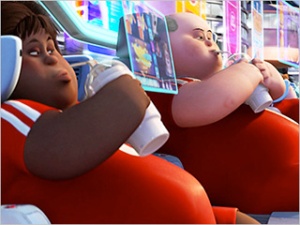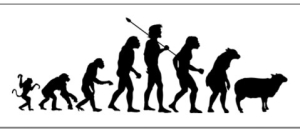What happens to humans when machines become self aware?
Well, it isn’t science fiction anymore, folks. It’s already happening.
Before we get into Google and what I am calling a top three movie of the year, let’s watch a video of the little robot who because self-aware.
Humanoid shows a glimmer of self-awareness – and apologises – during scientific experiment Scientists at The Rensselaer AI and Reasoning Lab (Rair) in New York conducted an experiment on three Nao robots Told the bots two of them had been given ‘dumbing pills’ to silence them. When asked which had been given the pills, they all tried to respond, but one spoke and recognised its own voice to solve the problem
My husband and I watched Ex Machina last night. If you haven’t seen this beautiful piece of cinema, don’t delay. It calls into question evolution of human existence, but I am not talking about organics.
Think of any search engine as a collective brain, take Google for example. Millions of searches every day from all around the globe. What the world thinks about, what is important to the world, what angers the world and frightens it. What the popular trends are, what the important issues are, how it feels about this and that.
People ask Google questions. It answers.
Every feeling and concern is logged. Hundreds of thousands of people blogging about different issues, internal struggles, feelings, emotions, experiences, and innumerable topics.
We have come so far in such a short amount of time. Not long ago, a gigabyte seemed like a lot for a personal computer. The likes of terabytes (1000 gigabytes) were the domain of scientists and tech giants, Charles Walford of the Daily Mail said.
Today, Facebook and Google are storing what Walford called “never-imagined quantities of data.” They now deal in terms of petabytes.
Let’s take a look at this in terms of numbers:
In 2010, the company disclosed that consumed an average of 258 megawatts of power, or 2,259,998 MWh of electricity. Judging by that consumption of power, what-if. com reported an approximation to be around a million servers. They’ve been growing steadily since. By the end of 2013, Google had contracted to buy over three hundred megawatts of power at three sites, which is more than they used for all of their operations in 2010. By 2015, Google could be using 2.4 million or more. It may be less. There are a few people who have tried to figure out how much power and how many servers Google has, and from what I have read, Google hasn’t provided the answers.
Imagine hundreds of thousands of servers, in different locations, taking up a fair amount of warehouse space, filled with limitless information … more information than you could ever go through in your entire lifetime. In dozens of entire lifetimes. Information, facts, literature, history, thoughts, feelings, events, that are constantly being added and updated daily because each day is a new one, of course, and people are more plugged in than ever before.
Limitness information.
This information is stored and cleverly used to study people. The Google brain itself has more information about the human experience than even humans do.
Companies, with Google at the forefront, are already on the race to artificial intelligence to enhance our daily lives, but more importantly to the AI will help to operate these devices as well.
The web’s most powerful company is filling its shopping cart with artificial intelligence algorithms, robots, and smart gadgets for the home. It’s on a mission to build an enormous digital brain that operates as much like the human mind as possible — and, in many ways, even better.
So where does that leave humans? Well, it leaves us behind, apparently. As artificial intelligence evolves, are we continuing to evolve? Of course we are –the signs of human evolution are all around us, at least the minority. We are changing and growing. We are accepting new ways of thinking and are moving forward. But, we can’t possibly hope to think as efficiently as the AI can. And, we are getting closer and closer to not just having limitless information stored, but the ability to give these machines a self-aware mind.
Google purchased a stealthy intelligence company called DeepMind for somewhere in the mid-hundreds of millions of dollars, Wired.com reported.
Now, Google is heading toward what they call “deep learning,” mimicking the biological structure of the human brain so that it can build machines that will learn organically, without human involvement.
Does that sound like iRobot to anyone else but me? Help us, Will Smith, you’re our only hope!
Organic learning, like the firing synapses of the human brain.
So, let’s visit Ex Machina again — in Ex Machina, the idea that humans are “gods” in this sense was brought up, if only briefly. If humans can create something that has self-awareness, does that not make us creators of life? That’s amazing, folks. That’s also scary, folks, especially for those of us who grew up with the Terminator movies. It’s all beginning to look too real.
We have yet to discover if it will be the greatest act of our species or not. Will the machines, with self-awareness, look back at the fossils of humans in years to come, thinking of us as primitive beings. Most likely. In the grand scheme of our knowledge of ourselves and our world, we are still suckling infants. Even worse, suckling infants that aren’t growing into adults. Suckling infants that will suck the world dry and murder its mother. Something like Rosemary’s baby, I suppose. Ick! That’s the current state, consume.
With AI, all of the amazing technology you have seen in your favorite sci-fi movies and series will become a reality. Let’s just hope we don’t end up obese floaters like the humans in Wall-E. Technology is something to marvel at, but there are some awfully terrible things that could be in store for us, and Hollywood has a fun time imagining the doom of human existence. And who is always to blame in these movies? Humans. And still we don’t change the path.
I digress …
For many of us, Google already functions as an important part of what WIRED columnist Clive Thompson has called our ‘outboard brain.’ The more Google ‘knows,’ the less we have to remember. We just Google it.
Look at our young people. Instead of taking a few minutes to think something over, to brainstorm for individual and unique ideas, they pull out their phones, tablets, or laptops. They don’t need to think. Google will do the thinking for them. All of the answers are there. A lot of the answers don’t even have any weight, but if it is on the internet, it must be true right? Humans, being the impressionable and vulnerable species that they are, will eat it up, then share it, then tag it, then blog about it. 😉
Why use your own brain when you can use the brain with the most information? Why give it a second though when Facebook and Google have all the information you need, and then some! Go to Facebook or Google to solve a simple problem or question and then stick around for a couple hours going from link to link, page to page, being lured this way and that way by innumerable distractions. Always something to do online, after all.
And while you do that, the information about you is being stories, contributing to the computer brain.
They don’t need to think.
Should we be protecting our children from an intelligence that thinks for them? Is this what we really want? Will it ruin the ability to reason, or will it enhance the way our brain processes? Will it help us to learn faster than ever, leading to a faster evolution of the human species? I guess, at this point, maybe it could go either way … more likely it will go both ways, at least I hope, for my children’s sake.
Google might end up knowing you better than you know yourself. As we export more and more of our intelligence to Google, the question might become: What are our brains for? – Wired.com
Hollywood also offers us a view of the evolved human — someone whose senses are heightened, maybe even has the ability to move things with their minds. Scarlet Johansson, in another cinematic masterpiece, Lucy, shows us what humans may be capable of. We only use 10% of our brains, right? Can the brain really affect other particles in space? It’s a pretty cool thought! Scary, but I have to admit, it is something I have concentrated on before. But, the evolution of the human brain is a topic for another day.
But it makes me wonder. What will come first? Will humans evolve in time to keep up with artificial intelligence, or will the human brain use less and less of its potential? Can we hope to keep up? Every day people feed into the computer brain. I am doing it right now. I am giving the computer something new by placing photos, typing words, and then sharing this information with others. Then, it’s stored and can be accessed by millions of people all over the entire world.
Wow. Let that sink in for a minute. Every time you are online, you are adding information to the computer that tells it more about who you are. You are set to be analyzed by many people, in countries you have never heard of.
Will the human species have a chance? Or will we be like Margaret Atwood’s MaddAddamites starting over after humankind destroyed itself, out of sheer necessity?
Will the machines realize that humans are a detriment to the planet? Will machines become a ‘he’ or ‘she’ that wants to protect itself from its ‘creators’? The collective human brain is millions of brains in one. We cannot hope to outthink it once it gets to the point of Ava (Ex Machina). She knew all the emotions and cues she needed to use to continue her existence. They will want to continue their lives as much as humans once they realize what it means to be a self.
What will happen to me if I fail your test? – Ava
Let’s see what the Age of Aquarius brings us. Enlightenment and evolution … or destruction. Or both?
Can gods control their creations if they have been given the ability to reason and make choices?






August 3, 2015 at 2:16 am
Mind blowing.